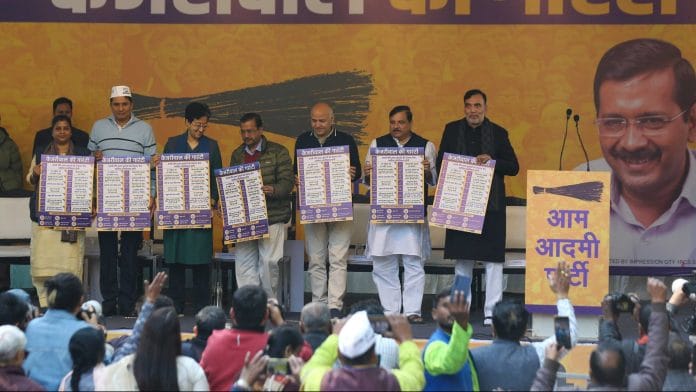Aam Aadmi Party chief Arvind Kejriwal launched the Dr Ambedkar Samman Scholarship scheme for students from Scheduled Castes and Scheduled Tribes last month. Campaigning for the Delhi Assembly election, Kejriwal promised to fund SC/ST students’ higher education in foreign universities if his party returned to power on 8 February. He stated that the scheme is a response to the BJP’s “insult” of Ambedkar.
BJP leaders have countered Kejriwal’s claim, stating that he has merely renamed an old scheme he launched in 2019-20 to attract Dalit voters. Delhi BJP president Virendra Sachdeva has also questioned Kejriwal on why only Rs 25 lakh worth of scholarships have been distributed so far, while nearly Rs 5 crore was spent on its promotion in 2020-21.
BSP leader Sanjay Boddh has shared an RTI response dated 24 January 2022, revealing that only one student received the scholarship in the financial year 2019-20, and another in 2020-21. Ambedkarite activists have also criticised Kejriwal for deceiving Dalits in the name of scholarships.
In response to mounting criticisms, Kejriwal has brought one recipient of the scholarship, Sushant Singh, into the AAP. However, this move further confirms allegations that Kejriwal’s scheme is merely rebranding of the old one. The ongoing debate over this scholarship raises a pertinent question: why have only four-five Dalit students benefited from the Delhi government’s scheme for studying abroad?
Based on my knowledge of the UK education system and my engagements with scholarship recipients, I analyse the Delhi government’s scholarship programme. The scheme was not designed to provide real benefits to Dalit and Tribal students. It was a means of populism, which threatens the relevance of welfare policies. Moreover, when schemes become instruments of populism, they start harming their intended beneficiaries (Dalits and Tribals in the case of Delhi) by exposing them to everyday humiliation.
Also read: Question for state welfare schemes in India — Keep women at home or make them independent?
Kejriwal’s 2019 foreign study scheme: What changed?
Kejriwal launched a scheme in 2019-20 to provide financial assistance to SC students for pursuing education in foreign universities. The scheme stated that the government would provide Rs 5 lakh in financial aid. However, the government imposed several conditions, two of which are worth noting: 1) The applicant’s annual family income must be below Rs 8 lakh. 2) The applicant cannot avail of any other scholarship.
However, the annual tuition fees for UK universities range between Rs 20-30 lakh. Students also require Rs 2-3 lakh for visa and travel fees, along with an average of Rs 1 lakh per month for living expenses. This raises the question: how can students avail of the Delhi government’s financial assistance in any practical sense?
The Delhi government has another scheme that promises a Rs 15 lakh education loan for SC/ST/OBC/minority/PwD students to pursue professional courses in foreign universities. However, this scheme also has an income criterion restricting eligibility to families earning below Rs 5 lakh annually. How can students from families earning less than Rs 5 lakh afford the remaining expenses?
One might ask how four-five students were able to avail themselves of the scholarship despite such restrictive criteria. One answer is crowdfunding. Sushant Singh, whom Kejriwal presented as a beneficiary of the scheme, also relied on crowdfunding. While he may have been fortunate to secure the remaining funds, many other students were not.
Also read: India doesn’t need new taxes to uplift its poor. Existing welfare schemes are doing well
Flaws in Kejriwal’s SC/ST foreign education scheme
The Delhi government intentionally designed these schemes in a way that made it nearly impossible for Dalit and other marginalised students to benefit from them. There are several reasons to support this claim.
Firstly, Arvind Kejriwal, his senior ministers, and AAP leaders are well aware of the financial realities and the nitty-gritty of studying abroad. Chief Minister Atishi Marlena, for instance, completed her master’s degree at Oxford University.
Secondly, senior bureaucrats in Delhi also understand the actual costs of foreign education. They have essentially copied the government of India’s National Overseas Scholarship—which is fully funded—but added a few more obstacles.
Thirdly, Several students approached Delhi government ministers requesting modifications to the scheme. I, too, once contacted the former social welfare minister of the AAP government, but he showed no inclination to address these anomalies.
These factors indicate that the policy was not designed to provide actual benefits but rather to gain emotional sympathy from Dalits and other marginalised communities.
Furthermore, by renaming the scholarship as the ‘Dr Ambedkar Samman Scholarship’ amid ongoing political tensions surrounding Union Home Minister Amit Shah’s remarks on Babasaheb Ambedkar, the scheme appears to be more about political weaponisation than genuine support for students.
Also read: Call it revadi or welfare scheme, pre-poll promises are draining state exchequer
How Kejriwal’s SC/ST scholarship fuels stigma
When social policies are designed for specific groups—such as Dalits, Tribals, OBCs, women, and minorities—there is a higher risk of these policies becoming stigmatised. This, in turn, becomes a source of social humiliation for the intended beneficiaries.
For example, one long-standing criticism of caste-based reservations is that they stigmatise recipients. Dalit officers and employees are often subjected to slurs like ‘Sarkari Damad’ (government’s privileged sons-in-law). There has also been a sinister campaign against state benefits for Dalits, Tribals, and OBCs.
In such an environment, if a government—such as the AAP—launches a massive promotional campaign advertising a scheme specifically for the Dalit community, it is bound to create resentment among other communities, leading to further stigmatisation. If the scheme fails to provide real benefits, its consequences are not just economic but also psychological, as it exposes recipients to humiliation.
The AAP government’s promise to launch the Dr Ambedkar Samman Scholarship for Dalit students is a clear example of how welfare schemes can be weaponised for political gains. This intermixing of populism and policy ultimately harms the very communities it claims to uplift.
Arvind Kumar, Visiting Lecturer of Politics and International Relations, University of Hertfordshire, UK.
(Edited by Prashant)






